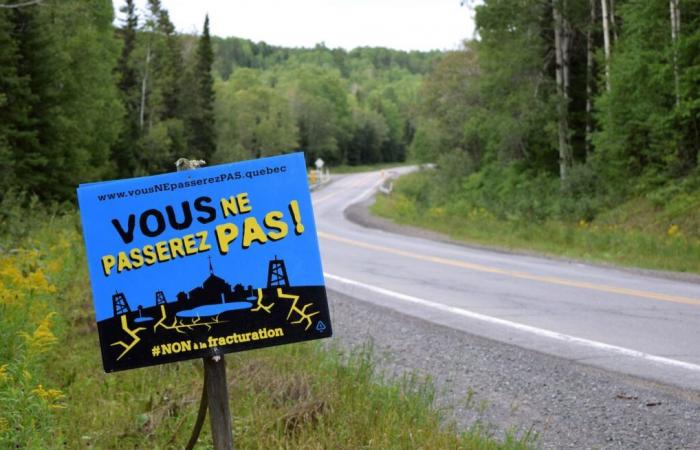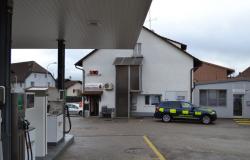Already 25 years since the year 2000. Duty takes us back to a quarter of a century marked by significant events and new trends that still shape our society. In this article: Has rejecting fossil fuel projects made Quebec’s energy consumption “greener”?
Exploitation of shale gas, search for oil on Anticosti Island or under the waters of the St. Lawrence, construction of the Énergie Est pipeline and the Quebec LNG plant… the governments of Quebec have all come very close to authorizing major development projects for the fossil fuel industry in recent years, before finally turning its back on them. But have these refusals made Quebec’s energy consumption “greener”?
When the president of the Quebec Oil and Gas Association, André Caillé, appeared at the offices of the Duty in the spring of 2010, he unrolled a map on which we noted that all of southern Quebec was covered with oil and gas exploration permits. From the island of Montreal to the tip of Gaspésie, via the St. Lawrence River, hundreds of permits acquired at 10¢ per hectare cover the territory without taking into account its uses. Even Île d’Orléans, Île aux Coudres and Île Verte are covered in permits.
The general public is completely unaware of what shale gas and oil are, no public debate has taken place on the possible exploitation of these resources and there is no assessment of the environmental impacts. However, the industry has already convinced the Liberal government of Jean Charest to move forward. “We will allow you to spread your wings,” the Minister of Natural Resources, Nathalie Normandeau, promised them in 2009. The companies’ objective, if the commercial potential had been confirmed, was to drill no fewer than 20,000 wells in the St. Lawrence Valley.
Even if the Liberals then asserted that “this is an appointment for Quebec that it cannot miss”, things did not go as the industry wanted. The debate heated up rather quickly, remembers director Dominic Champagne, who was involved in the mobilization against the industry. “When I showed up at a meeting that was supposed to be used to talk about social acceptability, I saw the staging. I didn’t know the energy issue very well, but I recognized the staging, with the coffee, the cupcakes, the microphones and the industry representatives who praised what they presented as the wonders of gas exploitation. . I was furious because they insulted our intelligence,” he emphasizes.
He was not alone in speaking out against the development of this sector, and we know the rest. The shale gas saga provoked an outcry that forced subsequent governments to close the door temporarily, then permanently, while providing financial compensation for companies that still held 182 permits (32,000 km2) in 2021, despite the ban on fracking.
Business “lobby”
In the end, just 18 wells were drilled and fractured. Many still leak methane, a very powerful greenhouse gas, as demonstrated Duty in 2024. And the Quebec government is today targeted by several lawsuits from companies claiming billions of dollars in compensation, claiming to have been “expropriated”.
The very lively shale gas controversy did not prevent the PQ government of Pauline Marois from signing a contract in 2014 for oil exploration on Anticosti Island in partnership with private companies. Quebec then planned to spend $115 million to try to determine whether there was commercial potential for shale oil.
“There was a very strong lobby in favor of fossil fuels,” underlines today Martine Ouellet, who was Minister of Natural Resources in this PQ government. “For me it was very clear. Whether it was shale gas or shale oil, there was nothing economic or environmental,” she adds. “All these projects were pushed by lobbies, and the governments were too much at the service of the lobbies. But, fortunately, the citizens stood up, and we saw great citizen victories. »
It was ultimately the liberal government of Philippe Couillard which put an end to the project in 2017. The latter did not lead to the discovery of oil potential, but it cost the Quebec state $92 million, mainly to compensate companies for the end of this saga. The largest island in Quebec has since been included on the UNESCO world heritage list, due to its unique fossil heritage in the world.
Pipeline et GNL
Failing to exploit possible gas or oil resources, the commercial potential of which has never been independently demonstrated, Quebec could have become a real hub for the export of fossil fuels from Western Canada.
At the beginning of August 2013, shortly after the Lac-Mégantic tragedy, the multinational TransCanada (now TC Energy) announced its intention to build the Energy East pipeline, which would transport 1.1 million barrels of tar sands oil every day in crossing Quebec territory over nearly 700 kilometers (not counting hundreds of rivers and several municipalities), oil which would then be exported from a port which would be built in Cacouna, an area described as a “nursery” for St. Lawrence belugas.
Philippe Couillard’s Liberals will be “favorable” to the megaproject, but it will be marked by several controversies: seismic surveys in the beluga habitat, repeated refusals by TransCanada to produce a Quebec impact study, secret meetings of federal commissioners with company representatives (including Jean Charest), etc. Faced with strong opposition from municipal officials, environmental groups and citizens, the pipeline project was finally abandoned in 2017, with TransCanada citing a business decision.
In the meantime, another fossil fuel export project passing through Quebec emerged in 2015: Énergie Saguenay (GNL Québec). The objective of American promoters is to build a gas pipeline on Quebec soil, but also a liquefaction plant for natural gas from Western Canada (exploited mainly by fracking) and a maritime terminal in Saguenay.
Several CAQ ministers will come to the defense of this project, with Prime Minister François Legault even going so far as to affirm that the export of 11 million tonnes of LNG per year could “help the planet” to fight against the climate crisis. But at the end of a polarizing debate in the region and elsewhere in Quebec, the report from the Office of Public Hearings on the Environment concluded instead that the project would cause an increase in greenhouse gas emissions and that it would risk slow down the energy transition. This gas plant also represented risks in terms of social acceptability and protection of biodiversity.
Result: the Legault government closes the door in the summer of 2021, followed by the federal government. The promoters have since turned to international arbitration and are seeking at least $1 billion in financial compensation. The hearing is scheduled for December 2025.
A green Quebec?
The shutdown imposed on the shale gas industry, the end of the oil saga on Anticosti and the rejection of GNL Québec have often been mentioned by elected officials as examples of decisions which have contributed to defining Quebec as a society oriented towards the “transition” and determined to fight against environmental crises.
Is Quebec greener for all that? No, essentially answers the holder of the Chair of Energy Sector Management at HEC Montréal, Pierre-Olivier Pineau. “We have said no to fossil fuel production projects, but Quebec has not reduced its consumption of fossil fuels in any way in recent years, apart from the COVID-19 period. The province even broke its historic record for gasoline sales for the road sector in 2023, with more than 9 billion liters,” he explains.
No less than half of the energy consumed in Quebec still comes from fossil fuels. Transport, which depends on more than 97% of petroleum products, is indicative of this appetite. And since 1990, the sector’s total energy consumption has increased by 41%, in a context where the fleet of personal vehicles has increased by 57%, “an increase more than twice that of the province’s population growth.” , specifies the most recent edition of theState of energy in Quebec.
“The electrification of transportation will gradually help reduce our consumption of petroleum products, but until now, electrification efforts have only added electric vehicles to the automobile fleet, without reducing the number of vehicles gasoline or diesel on the roads,” specifies Mr. Pineau.
“As it is the use of petroleum products and natural gas, much more than their production, which is a source of greenhouse gases, the fact of not producing in Quebec should not at all be a source of pride environmental. We only exported the emissions and the issues linked to production. It is ultimately a sign of hypocrisy rather than environmental rigor to ban the production of hydrocarbons while continuing to consume them,” adds Pierre-Olivier Pineau.
Quebec actually imports all the oil and gas it consumes. And according to the most recent data available, we are talking about more than 360,000 barrels of oil burned every day, or more than 130 million barrels per year, but also nearly 600 million cubic feet of gas per day.
Oil is transported here by ships, but also by the 9B pipeline, which transports oil from Western Canada and American shale oil crossing part of the territory and waterways. Quebec also consumes more shale gas than ever, even though it has banned this industry on its territory due to its environmental and social impacts.






